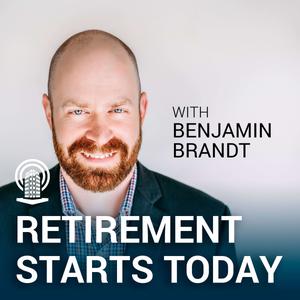
Beyond Finances
Eric Roberge, CFP & Beyond Your Hammock
with Eric Roberge, CFP
- 29 minutes 1 secondHow Kids Change You - and Your Financial PlanHow kids change you can be delightfully surprising. But they'll change your financial plan, too, in ways that might be challenging if you don't know how to adjust.
In what is probably news to no one, things change when you have kids.
You know your responsibilities will shift. Your schedule will probably get upended. The smaller your children are, the less personal freedom you may have.
How you experience all this, however, is unknowable.
The process itself alters who you are now, and how you perceive and react to your life with kids in ways that you could not have even imagined when you were childfree.
If you yourself are changed, you can expect your financial plan will need some adjustments too!
You’re going to have new goals. Your regular, ongoing expenses increase. You’re financially responsible for more; more can go wrong simply because there are more variables in the form of another human being in your life that you must care for and protect.
We dig into all this and more in this episode, where we share:
- The trickiest part of transformative experiences on our lives
- Our suggestion for solving the "wild problems" we all encounter (from the decision to have kids to any other major life choice or transition)
- How having a child changed each of us personally
- Updates you might need to make to your goals or priorities after having children
- The impacts kids can make on your present-day cash flow as well as your long-term financial objectives
- What strategies might need to shift within your financial plan to accomodate a growing family
- Why saving what you can when you can is so critical
- What you need to consider if generational wealth is important to you
25 August 2023, 9:00 am - 29 minutes 24 secondsMoney Tips from a Boston Financial Planner: Your Questions, Answered
You asked - now we answer your specific financial questions and try to provide clarity on some money situations that lots of folks tend to find themselves in.
We share our insights on:
- What to do with your money once you pay off debt, max out your retirement accounts, and aren't sure what to prioritize next
- How to think through a decision like investing in rental real estate properties
- What counts (and what DOESN'T) when talking about savings rates
- Where to put your cash if you want it to grow
- Which financial planning benchmarks you can use to determine if you're on track, ahead of the curve, or falling behind with your personal finances
Have a question you want featured on a future episode? Email [email protected]
4 August 2023, 9:00 am - 27 minutes 10 secondsProtecting Family Wealth: How to Safeguard Your Assets and Your Stuff
In the last episode of our 3-part series on strategic planning for your finances is all about protecting family wealth. If you're working hard to build assets, you need to protect that growing net worth - and part of that is making sure you and your family will be financially stable no matter what curveballs you may face along the way.
Instead of just running through "insurance 101" or defining parts of an estate plan, we're pulling back the curtain and showing you what a financial planner has for his personal finances and why he has it.
We'll discuss the types of insurance policies we personally have, and walk through the documents that make up our estate plan. Expect to hear:
-- Why we have to have this conversation in the first place - because it's not enough to build wealth. You have to protect it (and yourself, and your family) too!
-- What we looked for in a health insurance plan
-- The property & casualty insurance you have to have, and a separate, additional policy you might want to consider as well
-- What kind of life insurance we each have and what purpose it serves
-- The importance of disability insurance for professional couples
-- How we've protected ourselves, our family, and our stuff with a comprehensive estate plan, what an estate plan actually does (it's WAY more than just wills!), and why almost everyone needs some type of estate plan for themselves, regardless of how much money you have
If you've made it this far, you know the importance of putting financial goals and decisions in the context of your values so you can sort through competing priorities. You know you need to build a financial plan that uses specific strategies to address your particular challenges and opportunities. And you understand that planning is key - but investing is critical, if you want to build real wealth.
Once that wealth-building machine is in motion, don't leave it vulnerable. Start here to understand the steps you can take to start protecting family wealth - which includes you and your loved ones, too.
14 July 2023, 9:00 am - 34 minutes 31 secondsStrategic Planning, Part II: Investment Management
Welcome back to our series on strategic planning for your personal finances. Today's episode is part II, and we're covering all things investment management.
We'll talk through what you need to do to put together a sound investment strategy for yourself, and the to-dos any investment manager should take (whether that's you as a DIYer, or an advisor who you hire to manage your assets for you).
This episode covers:
- Assessing risk tolerance and risk capacity (and the difference between the two)
- Understanding your investment time horizon
- Allocating your assets correctly (which does NOT just mean what percentage of your portfolio should be in stocks vs. bonds)
- Selecting investments and coordinating account types
- Diversifying your investments - in all kinds of ways! Diversification of specific assets, across asset classes, with the specific vehicles you use (and what specific assets you put into each account or vehicle you use)
- Considering tax impacts of your investment choices (and the tax planning you should do for your investment portfolio)
- Calibrating your portfolio for the return you need (which includes knowing reasonable return expectaions)
- Remembering fees and expense ratios - and other basics like rebalancing
- Explaining why tax loss harvesting is not right for everyone (sorry)
- Doing ongoing due dilligence to understand if and when you should replace assets in your portfolio
- Choosing contribution strategies
- Setting up standard rules to guide your ongoing decisions and complete maintenance over time
Ultimately, you should understand your investment stategy and why you set it, so you can stick to it when things get wonky in the markets (which is inevitable over time).
Finally, we'll give you the most important strategic planning advice for going through the process of setting up an investment management system that works for you: a good strategy, stuck with over time, is better than the "best" strategy you found only after trying multiple different things and interrupting your progress with each change.
Let's dive in and get into some investment management!
23 June 2023, 9:00 am - 30 minutes 56 secondsUsing a Strategic Planning Process for Your Finances (Pt I)
You've heard the term "financial plan" or "financial planning" a million times. But what does it actually look like to go through that process?
Today we're sharing how we construct strategic plans for personal finances. We'll take you to the inner workings of the framework and systems we use at Beyond Your Hammock to help people use their money as a tool to get more of what they want in life - now and into the future.
This is part one of our series that will explain the 5 stages of the financial planning process:
- Setting goals, clarifying priorities, and stating values
- Building out iteration one of a formal plan and choosing specific strategies to implement
- Developing investment strategies to serve as the engine of financial growth over time
- Protecting yourself, your family, and your assets
- Measuring, managing, and maintaining the complete financial plan over time
Our first episode will cover stages 1 & 2. Let's get planning!
9 June 2023, 9:00 am - 25 minutes 2 secondsHow to Better Manage Bonus Money and Other Lump Sum Payments
Do you earn bonuses, commissions, grants of equity comp, or other types of variable income? Then you better know not just how to manage it, but also how to optimize these lump sum cash inflows to help you achieve your goals and grow your wealth.
In this episode, we'll explain how to do it. Join us as we discuss:
- What counts as "variable income," or what lump sums of money you may receive over time
- The number-one thing to do if you receive a lump sum of cash, from any source
- Two main methods to manage cash flow for solid but unpredictable income streams
- The mistakes to avoid when you receive any kind of lump sum payment
- Why you have to invest some of these cash inflows
For our financial planning clients, managing lump sum cash inflows is a constant conversation. Getting this right becomes especially important when we're talking about total incomes of $500,000 or more, when half or more of that sum will hit quarterly, semi-annually, or even once a year.
Managing big lump sums like that is a skill; cash flow management can get complex not just due to the size of these cash infusions, but due to timing. This episode will help you strategize and plan around your variable income so you can achieve your most important financial goals.
24 March 2023, 9:00 am - 23 minutes 48 secondsShould the SECURE 2.0 Act Change Your Financial Plan?
New rules and regulations pushed forward by the SECURE 2.0 Act might impact how your manage your money right now, and into the future. Here's what you need to know.
The SECURE 2.0 Act is a 1.7 trillion dollar spending bill passed by Congress in 2022. This legislation's scope went far beyond "let's adjust how retirement plans work," but the details within the bill did change many rules relating to retirement plans
Therefore, it changed the strategies you need to consider for managing yours as part of your overall financial plan.
This conversation proves the point we make all the time: you have to build a plan that can flex and bend with changing realities. In this case, those changes include:
- Removing the requirement to choose between student loan debt repayment and saving for retirement
- Increasing the options you have for how you use 529 plan savings... and giving you an avenue to roll that money into Roth accounts in the future
- Giving business owners and freelancers the option to choose between traditional and Roth retirement plans
- Adjusting the age you must begin making required minimum distributions from retirement accounts in the future (which can drastically change your savings strategy in the present)
- Letting employees have more control over how they receive employer contributions into retirement plans
If you're ready to check and see if your financial plan needs an update, join us in this conversation about what the SECURE 2.0 Act changed and how it affects your personal finances.
17 February 2023, 12:00 pm - 32 minutes 49 secondsManaging Money Together: How to Handle Finances in Your Relationship
Money and marriage is a serious topic, if only because getting it wrong can lead to devastating results: 48% of people report fighting about money; 60% of those fights tend to be about spending. 41% of Gen Xers and 29% of baby boomers surveyed by TD Ameritrade report that money was a direct cause of a divorce, and some research shows that disagremeents about money are a leading predictor of future divorce.
So today, we're not just talking about money. We might be saving your marriage, too!
We'll share the best strategies for managing money as a couple. We'll not just provide some big-picture tactics you can use - but also share the details on what we do and how we divide the responsibilities of financial planning and management in our own household.
Money touches every aspect of your life. And everyone has different money mindsets, perspectives, experiences. It's almost like a setup for an argument. It's inescapable, and it's also very likely that you are going to disagree on the right course of action more than just occasionally.
So how do you work it out? How can you effectively manage money together? Tune in for our tips - and our specific recommendation on whether you should combine or separate your finances within your married life.
20 January 2023, 10:00 am - 29 minutes 12 secondsHow Much You Need to Save in 2023
In this episode, we're sharing our 4-step framework to help you hone in on a savings rate that's right for you.
If you ask 10 different people how much you need to save per year to set yourself up for a secure financial future, you will probably get at least 15 different answers. It's confusing! And even if you go with the most common answer to "how much do I need to save," which may be 10 to 15 percent of your gross income each year, that might still not get you to the right answer FOR YOU.
(Spoiler alert: 10 to 15 percent probably isn't going to be enough.)
So how DO you figure out this complicated, confusing question that EVERYONE, regardless of income or financial status or goals that they have, needs to ask and answer?
Tune in to get the framework, and join in on the conversation as we walk through some specific savings rates to discuss why they do or don't work.
6 January 2023, 10:00 am - 25 minutes 12 secondsThe Best Short-Term Investments: What to Know (and What to Avoid)
It's your money, and you need it now! In this episode, we discuss the best short-term investments when you want to earn a return from your cash - without exposing it to a risk of loss. We cover:
- How current events may drive people to make bad investment decisions
- Why you have to start the short-term investment convo with an understanding of risk and reward
- What to look for when considering a short-term investment (and what you should expect)
- Red flags to avoid when presented with investment opportunities
- Specific investment vehicles to consider for your cash when you want some kind of return, but also need to keep that money safe
We wrap up the conversation with a lightning round of dos-and-don'ts, questions-and-answers on the best short-term investments you might want to consider for your own cash - and a warning on why it's almost never "different this time."
23 December 2022, 10:00 am - 27 minutes 31 secondsThe Only Constant Variable in Finance (and Life)
The only constant variable that you can truly rely on is change.
This is what makes financial planning so hard. An actual plan that you put down on paper is outdated before the ink is even dry, because every single piece of new information will throw your charts and your projections and your linear action steps out of whack.
Plus, there's no one variable that you can plug in to account for "change." You cannot pin it down or make it more concrete. It's inherently unknowable, usually unpredictable, and rarely attributable to any one thing.
And yet you have to deal with it anyway. In this episode, we discuss a few strategies for working with change (rather than having it work against your plans), including:
- The biggest factor that people don't want to account for in their finances - but that is critical to consider
- The importance of giving yourself permission to change (and the costs of failing to do so)
- Ways to accept change and how to prepare for the unpredictable
- Why you must stay open, flexible, and, most importantly, connected with other people
- How to use your money to create a positive feedback loop that teaches you about yourself and your values
- The dangers of ignoring the reality of "the only constant"
9 December 2022, 10:00 am - More Episodes? Get the App
Your feedback is valuable to us. Should you encounter any bugs, glitches, lack of functionality or other problems, please email us on [email protected] or join Moon.FM Telegram Group where you can talk directly to the dev team who are happy to answer any queries.
 Retirement Starts Today
Retirement Starts Today
 Money with Friends
Money with Friends
 Popcorn Finance
Popcorn Finance
 Stay Wealthy Retirement Show
Stay Wealthy Retirement Show
 The FI Show
The FI Show
 Earn & Invest
Earn & Invest